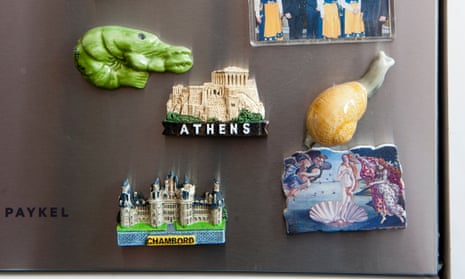
Fridge magnets can be cool aid to holiday memory recall, study finds
Some participants in Liverpool University survey said the travel mementoes were more important to them than photographs
Whether holding up shopping lists or hastily scrawled messages, fridge magnets are highly functional holiday souvenirs. And a new study suggests these trinkets may also provide an important means of accessing happy – and not so happy – memories of past trips.
Pervasive as souvenirs are, surprisingly little research has investigated what happens to them after people’s holidays have ended, and even less has focused on fridge magnets, even though we interact with them almost every day.
“If you think about how often you go into a fridge, it is very different from those cheese knives that you might buy, and then gather dust in a drawer, or a picture that gradually becomes wallpaper,” said Dr John Byrom, of the University of Liverpool, who led the research.
To better understand people’s relationships with their holiday magnets, Byrom and his colleagues conducted in-depth interviews – often in people’s kitchens, in sight of their fridges – with 19 Britons who owned at least 20 such holiday mementoes.
The research, published in Annals of Tourism Research, found that these souvenirs could help to preserve memories and trigger emotional responses, with some participants claiming their fridge magnets were more important than photographs as memory aids.
“If you go to any place, obviously in a day you could take 50 to 100 photos … Whereas now I don’t tend to take a picture of anything … I’ll just get a fridge magnet at the end,” one participant said.
Forgetting to buy a magnet can become a source of anxiety and stress. One women reported having to make a rash airport purchase, which she wasn’t happy about. And when Byrom recently presented his findings at a seminar, an attendee described having bought a magnet online and had it shipped from her holiday destination once she’d returned home.
“It was clear that when people talked through what their magnets meant to them, they were very easily able to generate these memories and responses of very specific events or people, including quite poignant examples of holidays that they’ve had with people who have died or children who have grown up and moved away,” Byrom said.
“It was also very interesting how fridge magnets can be used as a means of forgetting things that had been bad in your life, to reflect on how things got better.”
For instance, one participant used a fridge magnet from the worst holiday of her life – a trip to Spain that she hadn’t wanted to go on – as a reminder of quite how awful things were during that period of her life.
Byrom said the research had prompted him to spend more time looking at his own fridge magnets. “I don’t have many, probably about 10 that I’ve randomly acquired. But it has started me reflecting on those that I do have, such as a flags of the Caribbean magnet that takes me back to when I was on shared parental leave after my second child was born. I look at it and remember that beach in the Grenadines we were on, and things like that. I think the presence of these things it is actually quite meaningful.”
When we encounter a souvenir in our homes, it can act as a cue in our autobiographical memory system, which combines episodic memories recollected from our life with personal and general knowledge about the world.
“In my research, the first memory that came to mind was often close to the moment when the person bought the item,” said Dr Annemarie Zijlema, of the University of Greenwich, who investigates how personal items can trigger memories.
“In one of my studies, in which I interviewed people about memories and their souvenirs in Sydney, many participants showed me their fridges, some of which were filled with magnets from all the destinations they had been to. Some participants held on to them, even when they were broken.
“Interestingly, the study found that souvenirs that were seen frequently, such as the fridge magnets that they saw multiple times a day, led to remembering less than souvenirs not seen as often. These items just seem to become part of the home décor, and do not trigger memories [as much] unless asked about.”
Possibly then, house guests should ask people about their fridge magnets, to help keep their holiday memories strong.
“I think magnets are definitely a good conversation starter,” Zijlema said
Source: theguardian.com



